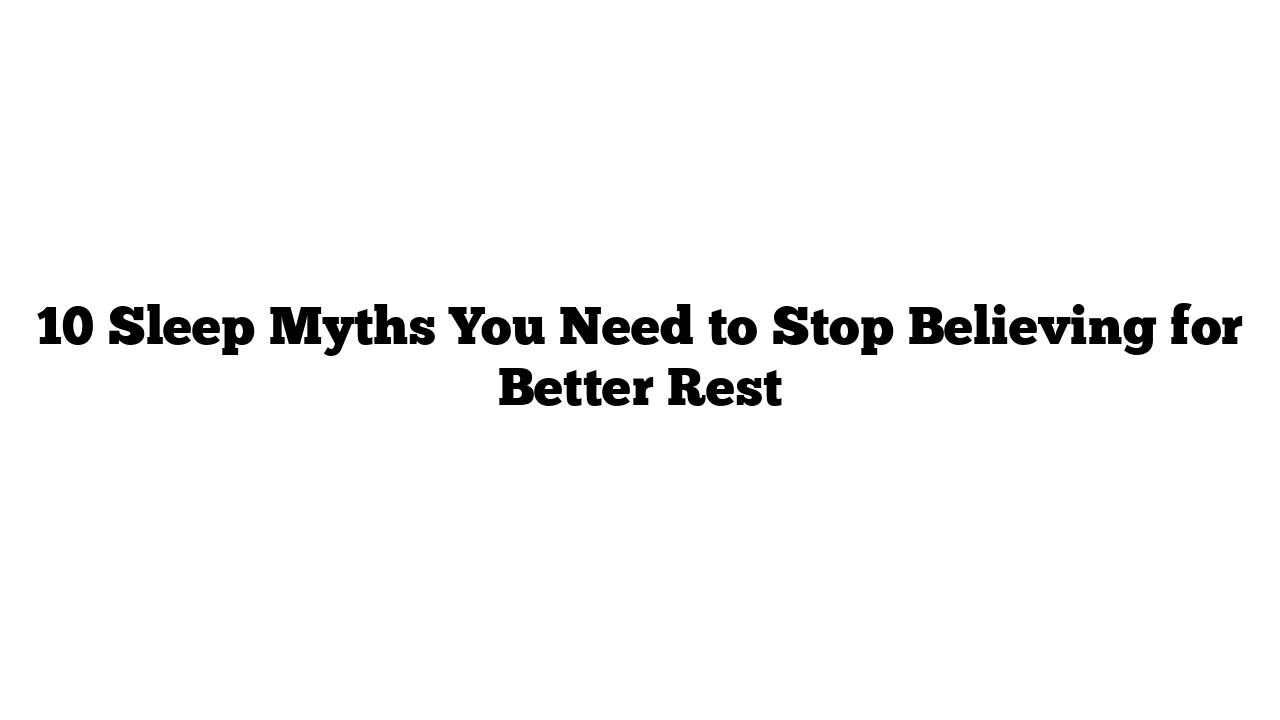Do you think you know everything about sleep? You might be surprised by what’s true and what’s just a myth. Here, we tackle some common sleep myths, provide the facts, and explain what really works for better rest.
Myth 1: The Golden Rule – Everyone Needs 8 Hours
It’s often said that everyone needs a full 8 hours of sleep to function well, but is that really true? According to the National Institute of Health, most adults in the USA need between 7 to 9 hours of sleep per night. However, this varies based on factors like your bedtime, how tired you are, and how quickly you fall asleep. A rare gene even allows some people to thrive on as little as 4 to 5 hours per night! For most of us, though, aiming for 7-9 hours is best. Remember, sleep needs vary from person to person.
Myth 2: Cheating Your Sleep Cycle Helps You Save Time
Think cutting your sleep by an hour or two each night won’t hurt? Actually, losing sleep adds up over time. Skipping an hour here and there might not seem like much, but by the end of the week, you’ll be an entire night short. Missing sleep regularly makes it harder to feel energetic, focused, and motivated. So don’t try to “cheat” your body; it needs proper rest to function well.
Myth 3: Sleeping at Your Desk Means You’re Lazy
Ever find yourself nodding off at your desk? This doesn’t necessarily mean you’re lazy or uninterested. In fact, feeling sleepy isn’t always due to boredom. Sometimes, even when fully engaged, exhaustion takes over if you aren’t getting enough rest at night. This type of drowsiness often comes from a lack of quality sleep, so listen to your body—it’s telling you to prioritize rest.
Myth 4: Your Brain Shuts Off When You Sleep
Many believe that sleep gives the brain a chance to “shut off,” but in reality, the brain stays active all night. During sleep, your brain logs memories, processes emotions, and detoxifies, as noted by the National Institute of Neurological Disorders. Your body might be at rest, but your brain is hard at work!
Myth 5: Monophasic Sleep (One Long Sleep) Is the Only Way
Most people have a monophasic sleep cycle, sleeping for one long period each night. However, this isn’t the only way to get rest. Biphasic sleep, which includes a long sleep with a nap during the day, is common and natural for some. In fact, a 1992 study suggests that human sleep patterns may have been naturally biphasic centuries ago. Napping can improve alertness and focus, so consider trying it if you’re constantly tired by mid-afternoon.
Myth 6: Insomnia Just Means Trouble Falling Asleep
Insomnia is more complex than people think. It doesn’t just mean you can’t fall asleep; it can also mean frequent waking throughout the night or waking up too early and being unable to fall back asleep. According to a 2015 study in the Singapore Medical Journal, insomnia varies greatly. So, if you experience different types of sleeplessness, you’re not alone, and there are ways to improve it.
Myth 7: Falling Asleep Anywhere Is Normal
Some brag about being able to fall asleep in unusual places, from office chairs to dining tables. But while this may sound impressive, it can be a sign of sleep deprivation. A 2007 study published in the Journal of Neuropsychiatric Disease and Treatment found that sleep deprivation leaves people drowsy throughout the day. While it may create funny stories, it’s a sign that your brain needs better rest.
Myth 8: Older Adults Need Less Sleep
While it’s common to see older adults waking up earlier, this doesn’t mean they need less sleep. In fact, the amount of sleep you need stays consistent throughout adulthood, from your 20s to your 80s. Children and teenagers may need more, but once you’re an adult, quality matters as much as quantity.
Myth 9: A Warm Bed Is the Best Bed
We all love to be warm and cozy at night, but too much warmth can actually hurt your sleep quality. According to a 2012 study in the Journal of Sleep, cooler temperatures are better for restful sleep. Keeping the room cool helps relax your muscles and improves morning alertness, making colder temperatures ideal for a great night’s sleep.
Myth 10: You Can Never Have Too Much Sleep
Ever catch up on sleep by sleeping 10-12 hours on the weekends? While the occasional long sleep may feel refreshing, regularly getting too much sleep can be harmful. A large 2018 study found that excessive sleep can affect memory, attention, and reasoning skills. So, while sleeping in occasionally is fine, it’s best to avoid overdoing it if you want a sharp, alert mind.
Wrap-Up: Getting to Know Your Own Sleep Needs
Understanding these myths can help you make better choices for quality sleep. Rather than following one-size-fits-all rules, focus on what works best for you. Good sleep is essential, so try to tune in to your body’s unique sleep needs and prioritize restful nights.
For more health insights, visit medicaltimes.io.
